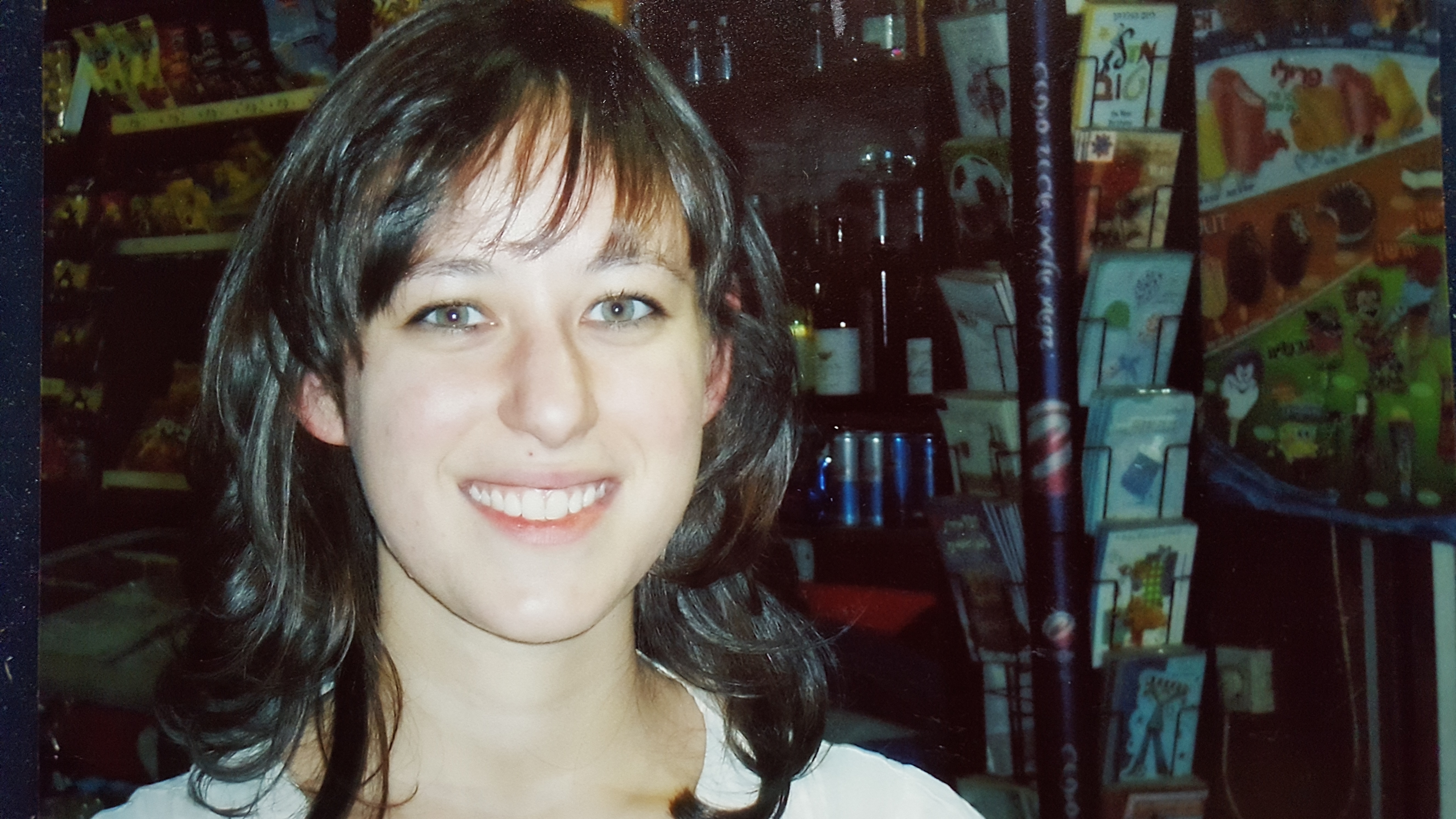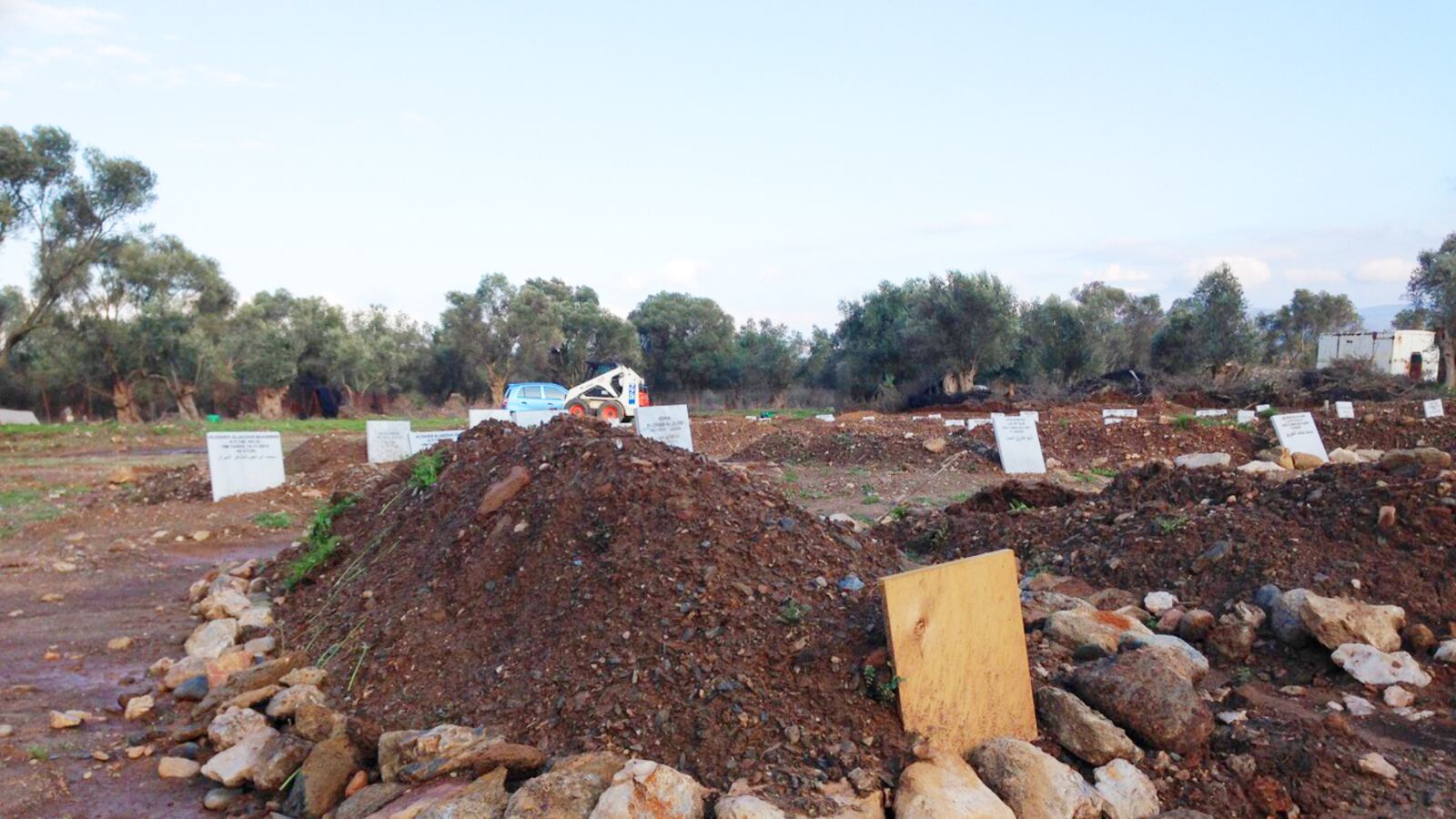KATO TRITOS, Greece — The corpses of 45 migrants were stacked in a freezer container on the Greek island of Lesbos weeks after the local cemetery had run out of space. They were the bodies of men, women, and children—in some cases without a head, or otherwise missing limbs—who had fled the war zones of Syria, Iraq, Afghanistan, and other troubled countries, and had tried without success to cross the choppy Mediterranean waters with hopes of reaching safety in Europe.
Mostafa Dawa, an Egyptian graduate of Islamic studies living on the island, insisted that they receive a proper Islamic burial, and so dug the graves himself and carried out the Islamic burial rituals on a plot of land at the foot of a nearby village.
“They are victims who pay the price for the politicians of the world, who could stop this at any moment but choose not to because these wars are profitable for them,” he said of the 66 migrants and refugees who have been laid to rest here.
Dawa is the self-appointed religious leader-mortician of this provisional outdoor cemetery, where locals from the nearby village occasionally visit to lay flowers at the side of the graves.
“It is my duty to be here, but there is no pride in this work,” said Dawa, who says he studied Sharia, or Islamic law, at al-Azhar University in Cairo, Egypt.
Before a few months ago, he had never seen or touched a dead body, but when a series of tragic shipwrecks occurred in the fall just off of Greek shores, dozens of corpses, including a number of young children, were virtually forgotten in the chaos of an island that has struggled to keep up with relief efforts.
Dawa had first come to Greece a number of years ago to study Greek literature at a university in the northern part of the country, he said, but now spends his days tending to the cemetery filled with mostly unidentified bodies.
According to Islam, ritual burial of the dead is required of all Muslims, and if it is not fulfilled, all Muslims carry the blame, said Dawa.
According to the International Organization for Migration, more than 4,000 migrants have died or gone missing at sea since 2015. They have most frequently attempted the short but treacherous route from the nearby Turkish coast toward Greece—seen widely as the gateway into the European Union.
On the Turkish side, families and individuals pay exorbitant prices, sometimes thousands of dollars per person, for a seat on substandard and over-packed dinghies that can easily capsize in the water, especially during wintery weather conditions.
The risks and the horror caught world attention when the body of 3-year-old Aylan Kurdi washed back onto the Turkish shore last September.

The smugglers advertise their services with glossy photos and overly optimistic promises of the humanitarian haven that allegedly awaits them upon arrival in Europe. But in reality, the refugees are often put into harm’s way so that the smugglers can rake in maximum profits.
Many passengers are also duped into buying unauthorized life vests filled with non-buoyant material that are of little help to the many unable to swim in the frigid waters of the Mediterranean. In January, Turkish police seized more than 1,200 unsafe life jackets produced en masse in an underground factory in Izmir, a major trafficking hub from which many refugees depart for the nearby Greek islands.
Like many of the local and international volunteers scrambling to provide emergency aid to the thousands making the journey towards Lesbos, Dawa’s involvement in the refugee crisis came about when he recognized an unmet need.
After a particularly disastrous shipwreck on Oct. 28 left more than 70 people dead, there was no more space in Lesbos’s main Christian cemetery. However, it took more than a month for Dawa to receive the land from the local authorities, and the cemetery is still waiting to be officially recognized.
He performed his last funeral in mid-February, when only the foot of a man estimated to be around 30 years old made its way through the morgue and eventually to Dawa.
As was the case with the 65 burials before that, Dawa carried out the procedures as mandated by Islamic tradition.
On a sturdy white table, Dawa washed the foot thoroughly, shrouded it in a white cloth, and then performed the prayer in the direction of Mecca, in this case, facing the surrounding olive trees.
Often alone on this quiet and bucolic plot of land, Dawa recites the prayer beginning with, “Allah, forgive our living and our dead, those present among us and those absent, our young and our old, our men and our women...”
“These are people who are displaced, who should have died in their lands, in Syria, in Iraq, in Afghanistan, but who instead died with no honor in the freezing seas,” said Dawa. “I am here to return to them at least the minimum honor that they deserve.”
Forty-one of the graves belong to unclaimed refugees. In those cases, Dawa transcribed in English, Arabic, and Greek the approximate age, the location from which the body was retrieved, and the date of death on the marble grave stones. The number of the DNA sample also appears, so that family members who may visit the island at a later date may be able to identify the bodies.

Those whose names are known include Adam Abu Jazar, a 3-year-old boy, buried alongside his brother and parents after their boat capsized in November.
Since 2015, more than a million migrants have crossed the Mediterranean in order to reach Europe. Most have taken the route from Turkey to Greece, the first front line of Europe’s refugee crisis.
But this island, home to only about 85,000 residents and with a limited infrastructure, has been overwhelmed.
“It is not our fault that these people are dying at our shores,” said Marios Adriotis, the press officer to the mayor of Lesbos. “The people here have been generous and eager to help because of our history,” he said, referring to the fact that many Lesbos residents descend from Greek refugees from Asia Minor who were evacuated to the island in 1923. “Even my own grandparents experienced this, so here we know that refugees are not a problem, they are innocent victims of other problems, which are the war in Syria on the one hand, and the smugglers on the other.”
Lesbos alone has received over 500,000 refugees and migrants who have arrived by sea. But while most see Greece as a temporary transit point through which to pass on the way to Germany or other more economically stable European countries, the country has increasingly become a holding pen as borders have been closed to those seeking to continue onto their final destinations.
In a March 1 statement Human Rights Watch condemned the “unconscionable” closures along the Greek-Macedonian border which have left thousands in a tense state of limbo.
“It’s ludicrous to see on one hand a relocation plan designed to alleviate the strain on Greece, and on the other hand efforts by some member states that risk turning the country into a massive refugee camp,” Eva Cosse, an HRW Greece specialist, said in the statement.
At the cemetery, Dawa placed blame on all of the world leaders, who he said further victimize refugees under the thin veil of security concerns.
“The world leaders talk about terrorism, but where is the terrorism?” he exclaimed. “No, the terrorists travel from country to country in private planes, only those who are desperate are dying at sea.”
But Dawa said he doesn’t often think of the protracted conflict, he focuses on the tasks at hand.
“You need endurance in these times, but I believe that eventually light will rise from the injustice,” he said, as a bulldozer expanded the cemetery, uprooting olive trees to make room for more graves in the event of another deadly shipwreck.






